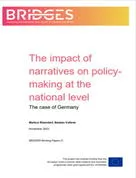The impact of narratives on policy-making at the national level. The case of Germany

BRIDGES Working papers nº 21 (November 2023)
This report investigates the evolving landscape of migration narratives in Germany, focusing on three pivotal events: the ‘migration crisis’ of 2015, the humanitarian catastrophe at the refugee camp ‘Moria’ in 2020, and the acceptance of Ukrainian refugees in 2022. Employing a multi-dimensional approach, the research scrutinizes narratives across media, political debate, and policy-making in terms of their key elements (characters, setting, plot and moral) as well as their style (lay vs. technocratic). Analysis of the textual data from these spheres is supplemented by insights gained through expert interviews with civil servants working in migration-related areas.
Against the backdrop of Germany’s history of migration and migration policy, the report notes changing patterns in German public attitudes towards migration, characterized by shifts from positive perceptions tied to economic needs, to negative sentiments during the 2015 crisis, and a subsequent return to a more welcoming, economics-linked attitude in 2022, which is now challenged by a resurgent far-right opposition. Notably, these shifts in public sentiment are not consistently mirrored in media narratives, which have maintained positive narratives, casting migrants as victims and Germany as a hero. The research identifies nuanced differences in narrative framing across the case studies, especially concerning the portrayal of villains and the depth of analysis of root causes.
Furthermore, the study delves into whether and how media narratives are embraced, adapted, ignored or rejected in political debates and policy-making. While political debates largely embrace media narratives, even retaining their lay style, policy-making exhibits a more varying relationship. The coordinative sphere shows a convergence with media narratives in certain cases, such as the ‘migration crisis’ of 2015, but also reveals divergence, particularly in the case of ‘Moria’ in 2020.
On a broader level, our research identifies variations in consensus and controversy between the communicative and coordinative spheres, with the 2015 and 2020 case studies demonstrating differing patterns. Additionally, the study highlights the distinct approaches of opposition and government parties in the coordinative sphere, emphasizing how opposition parties often extend lay-style narratives from the communicative sphere into policy-making.
In conclusion, this research offers valuable insights into the complex interplay of public sentiment, media discourse, political dynamics, and policy formulation in the context of migration narratives in Germany. The findings contribute to a deeper understanding of the intricate relationships between these spheres and how narratives might impact policy-makings processes in specific contexts.
Keywords: migration narratives, politics, policymaking, refugee crisis, Ukraine, Moria